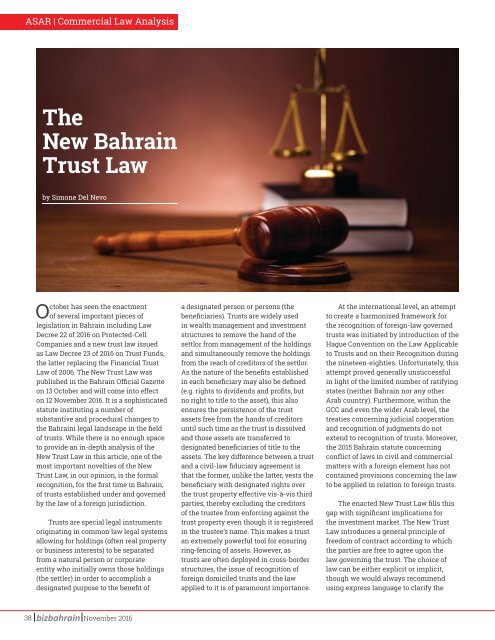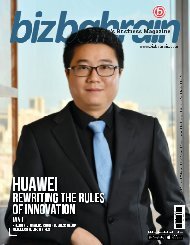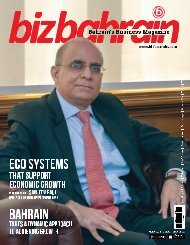BizBahrain November 2016
Create successful ePaper yourself
Turn your PDF publications into a flip-book with our unique Google optimized e-Paper software.
ASAR | Commercial Law Analysis<br />
The<br />
New Bahrain<br />
Trust Law<br />
by Simone Del Nevo<br />
October has seen the enactment<br />
of several important pieces of<br />
legislation in Bahrain including Law<br />
Decree 22 of <strong>2016</strong> on Protected-Cell<br />
Companies and a new trust law issued<br />
as Law Decree 23 of <strong>2016</strong> on Trust Funds,<br />
the latter replacing the Financial Trust<br />
Law of 2006. The New Trust Law was<br />
published in the Bahrain Official Gazette<br />
on 13 October and will come into effect<br />
on 12 <strong>November</strong> <strong>2016</strong>. It is a sophisticated<br />
statute instituting a number of<br />
substantive and procedural changes to<br />
the Bahraini legal landscape in the field<br />
of trusts. While there is no enough space<br />
to provide an in-depth analysis of the<br />
New Trust Law in this article, one of the<br />
most important novelties of the New<br />
Trust Law, in our opinion, is the formal<br />
recognition, for the first time in Bahrain,<br />
of trusts established under and governed<br />
by the law of a foreign jurisdiction.<br />
Trusts are special legal instruments<br />
originating in common law legal systems<br />
allowing for holdings (often real property<br />
or business interests) to be separated<br />
from a natural person or corporate<br />
entity who initially owns those holdings<br />
(the settler) in order to accomplish a<br />
designated purpose to the benefit of<br />
a designated person or persons (the<br />
beneficiaries). Trusts are widely used<br />
in wealth management and investment<br />
structures to remove the hand of the<br />
settlor from management of the holdings<br />
and simultaneously remove the holdings<br />
from the reach of creditors of the settlor.<br />
As the nature of the benefits established<br />
in each beneficiary may also be defined<br />
(e.g. rights to dividends and profits, but<br />
no right to title to the asset), this also<br />
ensures the persistence of the trust<br />
assets free from the hands of creditors<br />
until such time as the trust is dissolved<br />
and those assets are transferred to<br />
designated beneficiaries of title to the<br />
assets. The key difference between a trust<br />
and a civil-law fiduciary agreement is<br />
that the former, unlike the latter, vests the<br />
beneficiary with designated rights over<br />
the trust property effective vis-à-vis third<br />
parties, thereby excluding the creditors<br />
of the trustee from enforcing against the<br />
trust property even though it is registered<br />
in the trustee’s name. This makes a trust<br />
an extremely powerful tool for ensuring<br />
ring-fencing of assets. However, as<br />
trusts are often deployed in cross-border<br />
structures, the issue of recognition of<br />
foreign domiciled trusts and the law<br />
applied to it is of paramount importance.<br />
At the international level, an attempt<br />
to create a harmonized framework for<br />
the recognition of foreign-law governed<br />
trusts was initiated by introduction of the<br />
Hague Convention on the Law Applicable<br />
to Trusts and on their Recognition during<br />
the nineteen-eighties. Unfortunately, this<br />
attempt proved generally unsuccessful<br />
in light of the limited number of ratifying<br />
states (neither Bahrain nor any other<br />
Arab country). Furthermore, within the<br />
GCC and even the wider Arab level, the<br />
treaties concerning judicial cooperation<br />
and recognition of judgments do not<br />
extend to recognition of trusts. Moreover,<br />
the 2015 Bahrain statute concerning<br />
conflict of laws in civil and commercial<br />
matters with a foreign element has not<br />
contained provisions concerning the law<br />
to be applied in relation to foreign trusts.<br />
The enacted New Trust Law fills this<br />
gap with significant implications for<br />
the investment market. The New Trust<br />
Law introduces a general principle of<br />
freedom of contract according to which<br />
the parties are free to agree upon the<br />
law governing the trust. The choice of<br />
law can be either explicit or implicit,<br />
though we would always recommend<br />
using express language to clarify the<br />
38 <strong>November</strong> <strong>2016</strong>

















